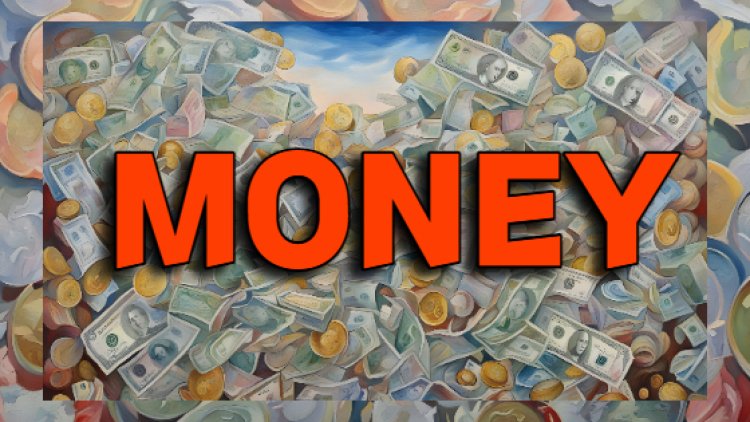Money! Money! Money!
To serve as a medium of exchange, unit of account, and store of value, money must first gain the confidence of its users before it can be worth anything.

Money! Money! Money!
To serve as a medium of exchange, unit of account, and store of value, money must first gain the confidence of its users before it can be worth anything.
The concept of money, serving as a means of trade, a unit for measuring value, and a store of wealth, is subject to the fluctuations of inflation and deflation, with its worth relying on the trust instilled in it by individuals.
For centuries, the notion of money has existed, evolving from bartering systems to the physical coins and banknotes used in modern times. This section delves into the historical progression of money and explores how different societies have employed various items as mediums of exchange. ?
Money serves three primary functions: as a medium of transaction, a standard for accounting, and a repository of value. This segment meticulously elucidates these functions while showcasing how money effectively facilitates commercial activities and economic transactions. ?
Within this portion, we delve into the diverse monetary systems that have existed throughout history, ranging from commodity money to fiat currency to representative money. Additionally, we shed light on the essential characteristics required for something to qualify as money. ?
To put it simply, money is indispensable for the prosperity of any economy. In this segment, we explore how the supply of money and monetary policies can significantly impact economic growth rates, employment levels, and price levels. ?
Inflation and deflation, which respectively denote the rise and fall in general price levels, are crucial concepts in economics. In this portion, we provide an explanation regarding their occurrence, the reasons behind them, and their subsequent implications for economies. ?
The significance of major global currencies such as the U.S. dollar, euro, and Japanese yen in international trade and finance is thoroughly discussed within this section. We also delve into the topic of exchange rates and their profound effects on economies worldwide. ?
Bitcoin and other cryptocurrencies serve as prime examples of digital currencies that have emerged alongside the advent of the Internet. Within this section, we dive deep into the realm of digital funds while analyzing their advantages, challenges, and potential impact on traditional financial systems. ?
As technology advances, the notion of money is shaping itself accordingly. We provide a glimpse into the future of money, taking into account developments such as cashless societies, digital currencies, and even the possibility of a global currency. Fascinating and thought-provoking. ?
The phenomenon known as "money illusion" occurs when individuals assign less value to actual money than its nominal worth suggests. This can lead to irrational financial decisions, such as prematurely celebrating a rise in income that fails to keep pace with inflation.
The inventor of Bitcoin, the first and most renowned cryptocurrency, remains shrouded in mystery under the pseudonym Satoshi Nakamoto. Despite numerous attempts to unveil Nakamoto's true identity, it remains one of the biggest enigmas in the financial realm.
Contrary to popular belief, not all U.S. currency features former presidents. Benjamin Franklin, who adorns the hundred-dollar bill, was never president himself. Additionally, Alexander Hamilton appears on the ten-dollar bill despite being one of the Founding Fathers rather than a former president.
Research indicates that paper bills can harbour more bacteria than an average toilet. A 2017 study discovered over 19,000 bacterial species on dollar bills obtained from a New York City bank.
In 2020, the United States encountered a significant coin shortage due to the COVID-19 outbreak. With many businesses closed and consumers opting for contactless payments, the normal circulation of coins within the economy was disrupted temporarily.
Although valid U.S. currency, $2 bills are seldom used, leading some individuals to believe they carry an inherent curse. However, there are over a billion $2 bills currently in circulation, making them less rare than commonly assumed.
The rise of digital payments has ignited debates regarding the feasibility of transitioning into a cashless society. While proponents argue that this change could result in increased efficiency and decreased criminal activity, others express concerns about the potential exclusion of individuals lacking access to digital banking services.
The debate surrounding the use of a gold standard monetary system, in which a country's currency is pegged to gold, is known as the "gold standard controversy." Critics claim that this could impair a government's ability to effectively respond to economic crises; however, proponents argue that it ensures long-term price stability.
Around 600 BC, King Alyattes of Lydia, located in present-day Turkey, minted the first coins in history.
During the Tang Dynasty in the 7th century, the Chinese were pioneers in utilising paper money.
The highest denomination ever printed by the U.S. Bureau of Engraving and Printing was the $100,000 bill featuring President Woodrow Wilson.
On the remote Pacific island of Yap, colossal stone discs—some as large as cars—are employed as a form of currency.
Queen Elizabeth II graces the British £5, £10, £20, and £50 notes, making her the longest-reigning monarch depicted on British currency.
In 2008, Zimbabwe issued a $100 trillion note during a period of severe hyperinflation.
In 2010, two pizzas were purchased for 10,000 bitcoins—an amount that is now valued at over $400 million. This marked the very first Bitcoin transaction.
Spanish dollars, commonly referred to as "pieces of eight," were widely utilised throughout the Americas and Asia during the 17th and 18th centuries, serving as one of the most renowned forms of pirate currency.
Okay, Now, check this out…
TradeFxP Features
If you choose to be a self-employed retail trader, here are a few things we offer:
-
The best trading Platform
-
No Requotes
-
Lowest Spreads
-
High-level liquidity
-
Interbank connectivity
-
Pure STP/DMA/ECN
-
Free signals
-
Best support
-
Crypto Wallet and withdrawals / Deposits (USDT)
-
Robust CRM
-
TradeFxP wallet
-
Once click withdrawal
-
Multiple payment options
-
Local offices to walk in
-
Free VPS
-
Free Video Chat / Virtual Meetings
-
And many more…
If you choose to be a part of our managed account program:
-
All of the above +
-
1-2% Daily Profits
-
High-level risk management
-
Capital protection
-
Only 30% of the capital used
-
Negative balance protection
-
Our fee is from the profits only
-
Monthly profit withdrawal
-
Wallet system – Use it like Phonepe, or Google Pay
-
Crypto wallet and withdrawals / Deposits (USDT)
-
Live monitoring
-
MyFxbook Live monitoring
-
Copy Trading
-
And many more…
Optional: If you do not withdraw your profits for 2 months, our system will use those profits to trade and will keep your 100% capital safe and secure for margin purposes. This is optional, and if you choose not to be a part of it, you can withdraw your profits from the first month itself.
Why 1-2% daily? Can't your managed forex account earn more?
Yes, we can! Remember: greed may be good in the beginning, but in the end, it will destroy everything. You and I know that! Many droplets make an ocean! Join the Managed Account Program and sit back for six months, then look at your account. You'll see that our strategy is good and the best. Do you know what I mean?
If you choose to be a part of us as an introducing broker (IB) or channel partner,
-
Industry best Rebates
-
Local Office support
-
Staff support
-
Marketing support
-
Marketing materials
-
And many more…
Having said that….
You can join our Forex Managed Account program and earn 1-2% profits daily. See for yourself by clicking the below link.
Have a great journey, and may you catch some big waves on your way to prosperity!
To see Ai Forex Trading for real, use these credentials.
-
Low-risk strategy:
-
Mt4: 112018
-
Pw: Allah@101
-
Server: tradefxp live,
1. To read why you should be with us, click here.
2. To open an account, click here.
3. To see our regulation certificate, click here.
4. To see our news with the IFMRRC, click here.
5. For claims, click here.
6. For the main site, click here.
7. For blogs and articles, click here.
8. Main Website: www.TradeFxP.com



 admin
admin 










